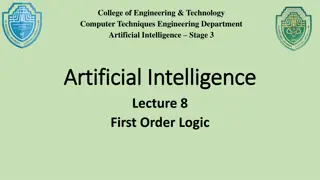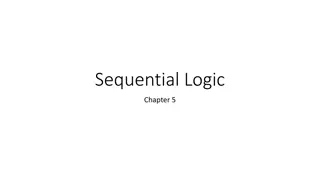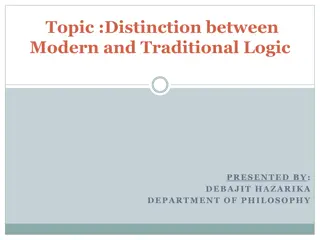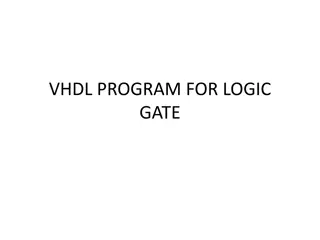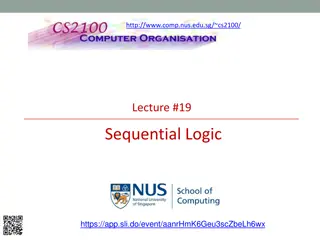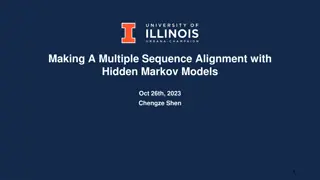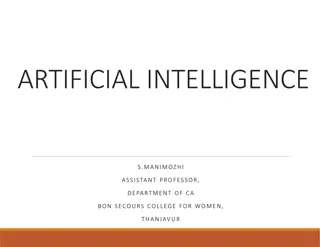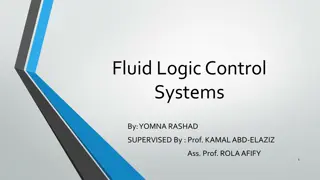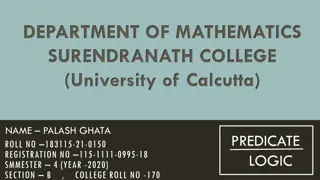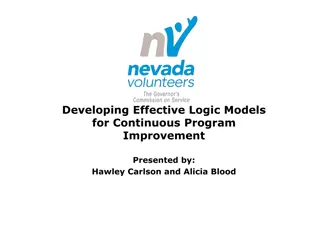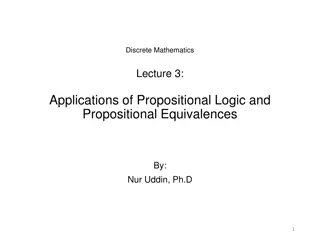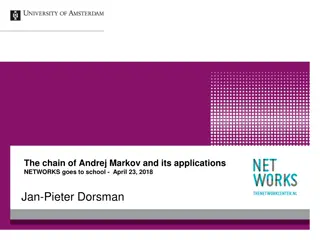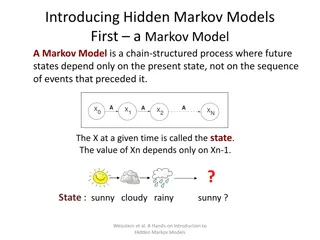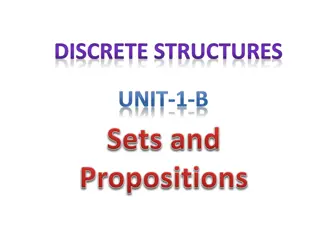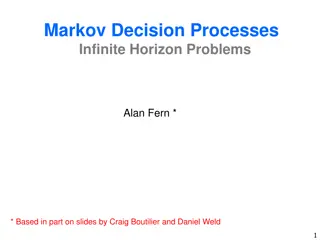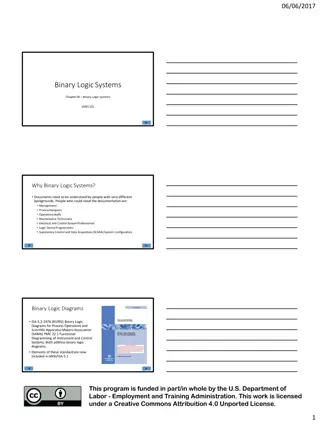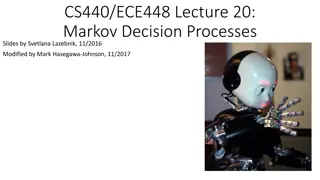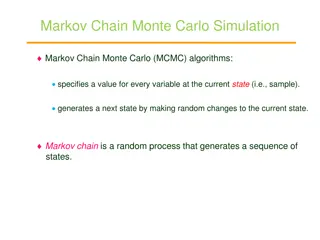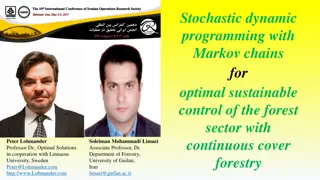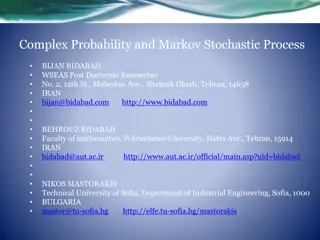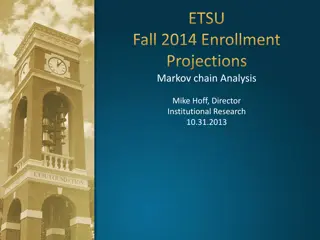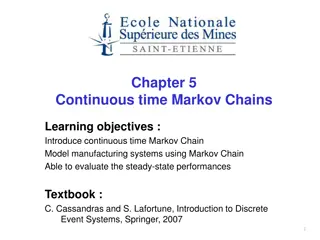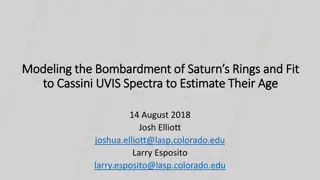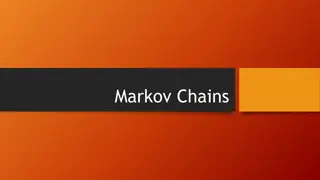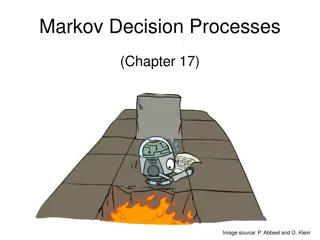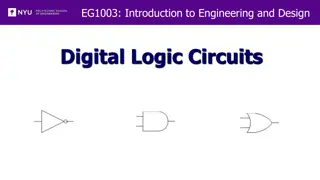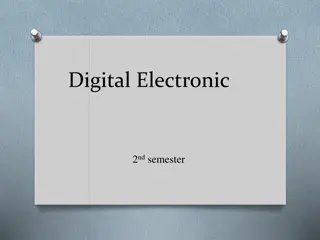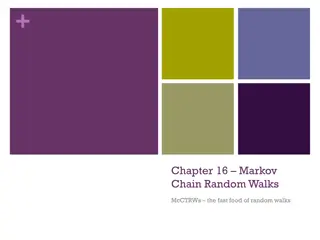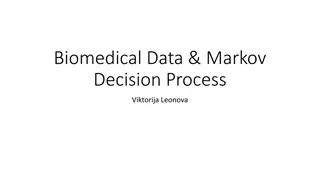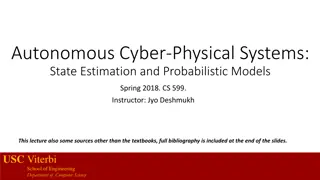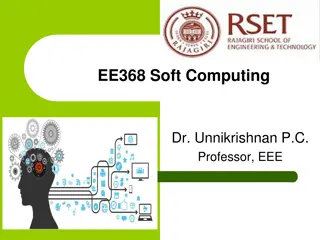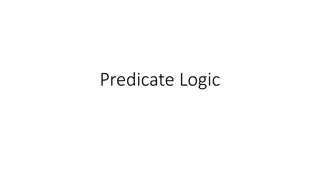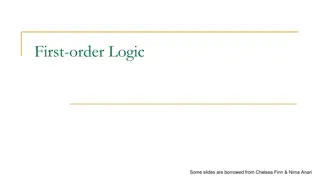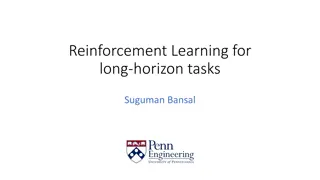Understanding First-Order Logic in Artificial Intelligence
Delve into the realm of first-order logic in artificial intelligence as a knowledge-based agent represents and deduces actions in its operating world. Explore the limitations of propositional logic and the expressive power of first-order logic, along with syntax, semantics, and models in logical lan
3 views • 27 slides
Understanding Sequential Logic Circuits in Digital Systems
Logic circuits in digital systems can be either combinational or sequential. Sequential circuits utilize storage elements along with logic gates, where outputs depend not only on present inputs but also on past inputs and internal states. They are essential building blocks, with storage registers pl
5 views • 20 slides
Topic : Distinction between Modern and Traditional Logic.
Logic, as a normative study, focuses on distinguishing correct reasoning from incorrect. Traditional logic, based on Aristotle's work, emphasized syllogistic reasoning, while modern logic, pioneered by figures like Leibnitz and Russell, employs mathematical methods and symbolic logic for a more adva
1 views • 10 slides
Logic Families
Logic families such as Diode Logic (DL), Resistor-Transistor Logic (RTL), and Diode-Transistor Logic (DTL) each have distinct capabilities and limitations when it comes to performing logic functions. While DL gates are simple and inexpensive but limited in functionality, RTL gates offer both normal
1 views • 22 slides
VHDL Logic Gate Programming Examples
This content provides VHDL code examples for various logic gates including AND, OR, NOT, XOR, and X-NOR gates along with their corresponding circuit diagrams. Each code snippet is accompanied by a brief explanation and a visual representation of the logic operation. The provided VHDL code can be uti
0 views • 7 slides
Understanding Sequential Logic in NUS CS2100 Lecture #19
Explore the concepts of sequential logic in Lecture #19 by Aaron Tan at NUS, covering memory elements, latches, flip-flops, asynchronous inputs, synchronous sequential circuits, and different types of sequential circuits. Delve into the distinction between combinatorial and sequential circuits, memo
2 views • 26 slides
Understanding Multiple Sequence Alignment with Hidden Markov Models
Multiple Sequence Alignment (MSA) is essential for various biological analyses like phylogeny estimation and selection quantification. Profile Hidden Markov Models (HMMs) play a crucial role in achieving accurate alignments. This process involves aligning unaligned sequences to create alignments wit
0 views • 29 slides
Understanding Predicate Logic in Artificial Intelligence
In the world of artificial intelligence, predicate logic plays a crucial role in representing simple facts. It involves syntax, semantics, and inference procedures to determine the truth value of statements. Real-world facts are represented using propositions in logic, allowing for structured knowle
1 views • 19 slides
Introduction to Fluid Logic Control Systems
Fluid logic control systems utilize devices that switch fluid, like air, between outlets, providing ON/OFF outputs swiftly based on control signals. This article explores moving-part logic devices, control functions, Boolean algebra applications in control technology, and advantages of fluid logic s
1 views • 22 slides
Understanding Logic Circuits in Aircraft Systems
Aircraft logic systems follow MIL/ANSI standard logic symbols and conventions used in electronic applications. Inverters, buffers, AND gates, OR gates, NAND gates, NOR gates, Exclusive-OR gates, and Exclusive-NOR gates are commonly used in aircraft logic circuits. These gates have specific behaviors
0 views • 52 slides
Introduction to Predicate Logic in Mathematics
Predicate logic is a powerful tool used in mathematics to express complex relationships and assertions that cannot be adequately represented by propositional logic. It allows for the quantification of statements over a range of elements using predicates and quantifiers like universal and existential
1 views • 13 slides
Developing Effective Logic Models for Continuous Program Improvement
Explore the essentials of logic models and their significance in evaluating programs for continuous improvement, presented by Hawley Carlson and Alicia Blood. Learn about theory of change, logic model components, and using logic models for evaluation planning.
4 views • 12 slides
Applications and Equivalences in Propositional Logic
This lecture explores applications of propositional logic, including translating sentences, system specifications, logic puzzles, and logic circuits. It also defines tautology, contradiction, and contingency as types of compound propositions, along with logical equivalences. Examples and illustratio
0 views • 16 slides
Understanding Markov Chains and Their Applications in Networks
Andrej Markov and his contributions to the development of Markov chains are explored, highlighting the principles, algorithms, and rules associated with these probabilistic models. The concept of a Markov chain, where transitions between states depend only on the current state, is explained using we
19 views • 21 slides
Introduction to Markov Models and Hidden Markov Models
A Markov model is a chain-structured process where future states depend only on the present state. Hidden Markov Models are Markov chains where the state is only partially observable. Explore state transition and emission probabilities in various scenarios such as weather forecasting and genetic seq
2 views • 12 slides
Understanding Propositional Logic and Mathematical Logic in Computer Science
Study the development of formal logic in computer science, focusing on propositional logic and mathematical logic. Learn about propositions, logical operators, and ways of combining statements to derive conclusions. Explore examples and understand how to determine the validity of arguments using log
0 views • 38 slides
Understanding Infinite Horizon Markov Decision Processes
In the realm of Markov Decision Processes (MDPs), tackling infinite horizon problems involves defining value functions, introducing discount factors, and guaranteeing the existence of optimal policies. Computational challenges like policy evaluation and optimization are addressed through algorithms
2 views • 39 slides
Understanding Binary Logic Systems in Documentation
Binary logic systems play a crucial role in documentation for individuals with diverse backgrounds such as management, process designers, operations staff, maintenance technicians, and more. These systems, depicted in binary logic diagrams, provide a clear and concise representation for various prof
4 views • 16 slides
Understanding Markov Decision Processes in Machine Learning
Markov Decision Processes (MDPs) involve taking actions that influence the state of the world, leading to optimal policies. Components include states, actions, transition models, reward functions, and policies. Solving MDPs requires knowing transition models and reward functions, while reinforcement
0 views • 26 slides
Introduction to Markov Decision Processes and Optimal Policies
Explore the world of Markov Decision Processes (MDPs) and optimal policies in Machine Learning. Uncover the concepts of states, actions, transition functions, rewards, and policies. Learn about the significance of Markov property in MDPs, Andrey Markov's contribution, and how to find optimal policie
0 views • 59 slides
Introduction to Symbolic Logic: Understanding Logical Inferences
Logic is the study of reasoning methods to distinguish between correct and incorrect arguments. Symbolic Logic involves representing logic symbolically for easier understanding and manipulation. Logical inferences help in making decisions based on reasoning chains. The content discusses the use of l
1 views • 28 slides
UBU Performance Oversight Engagement Framework Overview
Providing an overview of the UBU Logic Model within the UBU Performance Oversight Engagement Framework, this session covers topics such as what a logic model is, best practice principles, getting started, components of the logic model, evidence & monitoring components, and next steps. The framework
0 views • 33 slides
Understanding MCMC Algorithms and Gibbs Sampling in Markov Chain Monte Carlo Simulations
Markov Chain Monte Carlo (MCMC) algorithms play a crucial role in generating sequences of states for various applications. One popular MCMC method, Gibbs Sampling, is particularly useful for Bayesian networks, allowing the random sampling of variables based on probability distributions. This process
1 views • 7 slides
Optimal Sustainable Control of Forest Sector with Stochastic Dynamic Programming and Markov Chains
Stochastic dynamic programming with Markov chains is used for optimal control of the forest sector, focusing on continuous cover forestry. This approach optimizes forest industry production, harvest levels, and logistic solutions based on market conditions. The method involves solving quadratic prog
0 views • 27 slides
Understanding Complex Probability and Markov Stochastic Process
Discussion on the concept of complex probability in solving real-world problems, particularly focusing on the transition probability matrix of discrete Markov chains. The paper introduces a measure more general than conventional probability, leading to the idea of complex probability. Various exampl
1 views • 10 slides
ETSU Fall 2014 Enrollment Projections Analysis
The ETSU Fall 2014 Enrollment Projections Analysis conducted by Mike Hoff, Director of Institutional Research, utilized a Markov chain model to estimate enrollment. The goal was to reach 15,500 enrollments, with data informing college-level improvement plans. Assumptions included stable recruitment
0 views • 43 slides
Understanding Continuous-Time Markov Chains in Manufacturing Systems
Explore the world of Continuous-Time Markov Chains (CTMC) in manufacturing systems through the lens of stochastic processes and performance analysis. Learn about basic definitions, characteristics, and behaviors of CTMC, including homogeneous CTMC and Poisson arrivals. Gain insights into the memoryl
0 views • 50 slides
Modeling the Bombardment of Saturn's Rings and Age Estimation Using Cassini UVIS Spectra
Explore the modeling of Saturn's rings bombardment and aging estimation by fitting to Cassini UVIS spectra. Goals include analyzing ring pollution using a Markov-chain process, applying optical depth correction, using meteoritic mass flux values, and comparing Markov model pollution with UVIS fit to
0 views • 11 slides
Understanding Markov Chains and Applications
Markov chains are models used to describe the transition between states in a process, where the future state depends only on the current state. The concept was pioneered by Russian mathematician Andrey Markov and has applications in various fields such as weather forecasting, finance, and biology. T
1 views • 17 slides
Understanding Markov Decision Processes in Reinforcement Learning
Markov Decision Processes (MDPs) involve states, actions, transition models, reward functions, and policies to find optimal solutions. This concept is crucial in reinforcement learning, where agents interact with environments based on actions to maximize rewards. MDPs help in decision-making process
0 views • 25 slides
Understanding Digital Logic Circuits and Design Principles
Explore the world of digital logic circuits with a focus on logic gates, truth tables, boolean equations, and Karnaugh maps. Learn how to design combinational logic circuits, analyze different logic functions, and solve sample problems related to digital logic. Get hands-on experience with LabVIEW a
0 views • 28 slides
Introduction to Digital Electronic Circuits and Logic Gates
Understanding digital electronic circuits and logic gates is essential for building digital systems. This content covers the basics of logic gates, digital signals, and the practical application of binary digits in circuits. It discusses the function and importance of logic gates, such as NOT gates
0 views • 17 slides
Exploring Markov Chain Random Walks in McCTRWs
Delve into the realm of Markov Chain Random Walks and McCTRWs, a method invented by a postdoc in Spain, which has shown robustness in various scenarios. Discover the premise of random walk models, the concept of IID, and its importance, along with classical problems that can be analyzed using CTRW i
0 views • 48 slides
Understanding Biomedical Data and Markov Decision Processes
Explore the relationship between Biomedical Data and Markov Decision Processes through the analysis of genetic regulation, regulatory motifs, and the application of Hidden Markov Models (HMM) in complex computational tasks. Learn about the environment definition, Markov property, and Markov Decision
0 views • 24 slides
State Estimation and Probabilistic Models in Autonomous Cyber-Physical Systems
Understanding state estimation in autonomous systems is crucial for determining internal states of a plant using sensors. This involves dealing with noisy measurements, employing algorithms like Kalman Filter, and refreshing knowledge on random variables and statistics. The course covers topics such
1 views • 31 slides
Introduction to Logical Thinking: Science of Correct Reasoning
Logic, the science of correct reasoning, explores ways to infer conclusions from assumptions and validate arguments. This course introduces logic as a tool for analyzing arguments, automating processes, and enhancing communication clarity. Through classic logic variants like propositional and predic
0 views • 30 slides
Applications of Fuzzy Logic in Soft Computing
Fuzzy logic is primarily used as the underlying logic system for decision support systems in various applications. From fuzzy controllers to fuzzy rule bases, this technology enables approximate reasoning similar to human decision-making processes. Explore the architecture and major components of Fu
0 views • 27 slides
Understanding Predicate Logic and Quantifiers
Predicate logic extends propositional logic by allowing statements to be assigned specific values. The limitations of propositional logic are overcome through predicate logic, where statements like "?. is greater than 3" have subject and predicate parts denoted as ?(?). Furthermore, predicates can b
1 views • 20 slides
Understanding First-Order Logic Fundamentals
Explore the limitations of propositional logic and delve into the syntax, semantics, and inference rules of first-order logic. Learn about predicates, quantification, and how to express relationships among objects using predicates. Enhance your understanding of how first-order logic provides a more
0 views • 42 slides
Reinforcement Learning for Long-Horizon Tasks and Markov Decision Processes
Delve into the world of reinforcement learning, where tasks are accomplished by generating policies in a Markov Decision Process (MDP) environment. Understand the concepts of MDP, transition probabilities, and generating optimal policies in unknown and known environments. Explore algorithms and tool
0 views • 11 slides
